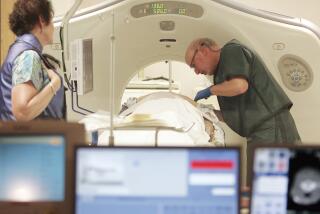Examining the Checkup
- Share via
Ideally, it’s an almost indulgent rite of self-reflection, a soothing embrace of common sense, as well as a chance to simply chat with a doctor. But the typical physical examination often feels more like a pit stop: Check the cholesterol, check that blood pressure and--done!--it’s back to the races. Especially for the doctor, who’s often running to the next appointment.
Leaving us to wonder: Is that it? Did we cover everything?
The answer is probably not, say public health researchers. Although a good physical usually provides that most potent health tonic--regular communication between you and your doctor--it’s considered an extravagance in this era of bottom-line medicine.
“A lot of what happens during a good physical is counseling and history-taking, and no one wants to pay for you to sit around and talk for 20 minutes,” says Dr. Paul Frame, a family physician in Cohocton, N.Y., who has served on the U.S. Preventive Services Task Force, which sets guidelines for physical exams.
That the talking and testing rarely turn up hidden disease in people without symptoms is beside the point, doctors say. The fact is, many of us change doctors or health plans so often that the regular physical exam gets lost in the shuffle. We forget; and there’s little incentive for our health plan du jour to remind us. And yet checkups are about the only excuse healthy people have to see a doctor at all--and the only opportunity to get valuable preventive testing and lifestyle advice from the one source we trust.
According to a 1998 Consumer Reports analysis of government health data, in fact, the length of the average checkup is only about 18 minutes.
Doctors in Ohio who have studied the exam say it typically lasts only 12 minutes. Take away a few minutes for paperwork, says Dr. Christopher Forrest, an associate professor at the Johns Hopkins University of Public Health, and you’ve got little time in which to fit preventive tests, such as cholesterol screening, and a review of family history, information which can be crucial to your long-term health.
In a 1997 study, researchers at Dartmouth Medical School surveyed 2,775 adults and found that those who got regular physicals were much more likely than those who didn’t to have had preventive tests such as mammograms and checks for colon cancer. “It’s not terribly surprising to see that result,” says Dr. Carol Sox, the study’s lead author, “but it does suggest the value in seeing a doctor regularly.”
The Consumer Reports study also shows what happens when doctors are rushed, or not careful: Only half of women older than 40 get a breast exam during their basic checkup, the analysis found, and doctors advised only one in three smokers to quit. They advised only one in five patients about diet.
Dr. P.K. Shah, director of cardiology at Cedars-Sinai Medical Center, said he sees patients who haven’t been counseled by their primary care doctors, or received basic tests--ever. Because of these lapses, patients were diagnosed later than they should have been or not advised that they were at risk for heart disease. “A number of patients in their mid-50s have never had a cholesterol check,” he says. “Or they had high cholesterol and nobody told them what to do about it.” Shah said he was “amazed at the number of people who come in and don’t understand that smoking is a major risk factor, not just for cancer, but for heart attacks and strokes.”
When it comes to smoking in particular, researchers say, doctors who push patients to quit often increase the smokers’ likelihood of doing so.
Dr. Donald B. Louria, chairman emeritus of the Department of Preventive Medicine and Community Health at Newark’s University of Medicine and Dentistry of New Jersey, did his own surveying of patients more than a decade ago. “I was simply appalled at how few people were getting any real preventive advice or procedures at all.”
Louria began lobbying the New Jersey legislature to require doctors and health plans to devote time solely to prevention. The New Jersey Health Wellness Promotion Act became law in November, guaranteeing millions of state residents a free, comprehensive annual exam that includes more than a dozen preventive procedures. The act applies to patients 20 or older covered under commercial HMOs and fee-for-service insurance plans in New Jersey.
The Health Wellness Promotion Act requires not only widely accepted screening procedures, such as blood pressure testing and Pap smears for women. It also prescribes testing regimens whose value has not been proved, such as yearly blood tests for cholesterol and glucose. But the law does not require health plans to remind members they are due for an exam.
Nonetheless, says Dr. Mohammad Akhter, executive director of the American Public Health Assn., the law is a good first step in turning doctors’ attention to preventive care. For example, under the law, doctors are required to ask their patients whether they have any health concerns of their own. Counseling on various topics, including breast or testicular self-examination, smoking cessation and weight control, is also required.
“I think it’s remarkable that they got so much counseling into the law,” says Dennis Fryback, a researcher at the University of Wisconsin and former member of Preventive Services Task Force. “It’s hard to convince people how valuable that is, and it’s terrific that they recognized it.”
These are important points, Akhter says, because health professionals are trained to focus their energies on treating sick people, not talking to healthy ones. “The behavior of medical practitioners will not change until it’s required,” he says. “What gets measured gets done.”
Says Louria, “Our goal is to make it a national policy. Our dream is that every adult in the United States can have an annual prevention exam.”
*
In the meantime, for those of us who don’t live in New Jersey, the U.S. Preventive Services Task Force offers a simple guide. Starting at age 21: Check blood pressure at least once every two years; and for women, have a Pap smear every one to three years, to age 65. In its latest report, in 1996, the task force recommends that women have a mammogram and breast exam once every year or two after age 50. But most doctors now agree that annual breast cancer screening should start after age 40.
You also should have a cholesterol test once around age 35 for men or 45 for women, and at least once every four to five years after that, the guide says. And after age 50, begin screening for colo-rectal cancer once every year or two.
Many urologists also recommend a prostate-specific antigen test to screen for prostate cancer once a year in men age 50 and older. But the evidence to recommend the PSA was not yet strong enough for the task force to include it in its latest recommendations in 1996, says Dr. David Atkins, coordinator of the group.
The task force also urges a discussion of lifestyle hazards, such as smoking and weight gain. In fact, says Johns Hopkins’ Forrest, one clue whether you’re getting a thorough physical is whether or not the doctor has elicited your concerns. “Did patients engage in a mutual dialogue about health with their doctors? That’s the question you need to ask yourself.”
Dr. Betsy Felser, assistant professor of internal medicine at USC, describes her ideal checkup: Start with a thorough health history, including questions about diet, exercise, smoking and family history. Inquire about allergies, medications, herbal supplements and medical procedures done in the past. Finally, give the appropriate screening tests based on the preventive task force guidelines. “Patients should be screened for a cancer that runs in the family several years before [the age at which] a family member was diagnosed,” she says.
For that matter, say consumer advocates, patients should know their own family history pretty well. “The key thing for a consumer is to be savvy,” says Charles Inlander of the People’s Medical Society, a consumer group based in Allentown, Penn. “You know your medical history better than any doctor. Don’t wait for your doctor to initiate.”
(BEGIN TEXT OF INFOBOX / INFOGRAPHIC)
Tests You Should Get
The U.S. Preventive Services Task Force recommends that adults 21 and older have these tests during their physical exam. Time intervals are the minimum suggested.






